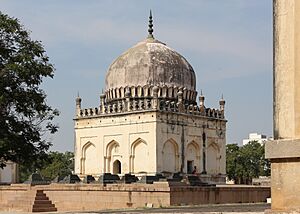Quli Qutb Shah facts for kids
Quick facts for kids Sultan Quli |
|
|---|---|
| Qutb-ul-Mulk (Pillar of the Realm) | |
 |
|
| 1st Sultan of Golconda | |
| Reign | 1518–2 September 1543 |
| Predecessor | Position established |
| Successor | Jamsheed Quli Qutb Shah |
| Born | 1485 Hamadan, Persia |
| Died | 2 September 1543 (aged 57–58) Hyderabad, Sultanate of Golconda |
| Burial | Qutb Shahi tombs, Hyderabad |
| Issue | Qutbuddin Jamsheed Abdul Khadir Abdul Karim Husayn Ibrahim |
| House | Qutb Shahi dynasty |
| Father | Uways Quli Beg |
| Mother | Maryam Khanum |
| Religion | Shia Islam |
Sultan Quli Qutb-ul-Mulk was a powerful ruler who founded the Qutb Shahi dynasty. This dynasty ruled the Sultanate of Golconda in southern India for many years, from 1518 to 1687. Sultan Quli was born in Persia and came from a group called the Turkoman people. He started his career serving another ruler, the Bahmani sultan. Because he was a great military leader, he earned the special title "Qutb-ul-Mulk," which means "Pillar of the Realm." Eventually, he took control of the Golconda region and started his own kingdom.
Contents
Who Was Sultan Quli Qutb-ul-Mulk?
Sultan Quli was born in 1485 in a city called Hamadan in Persia. His full name was Sultan Quli. He belonged to a group known as the Shi'i Turkoman people. His father was Uways Quli Beg, and his mother was Maryam Khanum.
Sultan Quli traveled to South India, possibly for horse trading. He moved to Delhi with his relatives and friends around the early 1500s. Later, he went south to the Deccan region. There, he joined the army of the Bahmani sultan. He was a very successful leader in battles. Because of his military skills, he was given the important title "Qutb-ul-Mulk."
How Did the Qutb Shahi Sultanate Begin?
The Bahmani Sultanate eventually broke apart into five smaller kingdoms. After this happened, Sultan Quli declared his independence. He took the title of Qutb Shah and started his own kingdom, the Qutb Shahi dynasty of Golconda.
Even though some people thought he didn't officially call himself a king, the writing on his tomb clearly calls him "Sultan Quli Qutb-ul-Mulk." This shows his important status. Some historians have said the word 'Sultan' in his name meant 'Servant of the Sultan.' However, his full name was a title of honor.
Expanding the Sultanate's Lands
Sultan Quli Qutb Shah lived at the same time as two famous rulers of the Vijayanagara Empire: Krishana Deva Raya and his brother Achyuta Deva Raya. Sultan Quli worked to make his kingdom bigger. He captured important forts and areas. These included places like Warangal, Kondapalli, Eluru, and Rajamundry. He took these lands while Krishnadevaraya was busy fighting another ruler.
Sultan Quli also defeated a ruler named Sitapati Raju (also known as Shitab Khan) and captured the fort of Khammam. He made the ruler of Jeypore, Vishwanath Dev Gajapati, give up all the lands between the Krishna and Godavari rivers. In 1513, the Vijayanagar army fought against Sultan Quli's forces in Pangal. Sultan Quli's army won this battle, and they captured the Pangal fort.
The End of Sultan Quli's Reign
In 1543, Sultan Quli Qutb Shah was tragically killed. This happened while he was praying. His second son, Jamsheed Quli Qutb Shah, was responsible for his death. After this, Jamsheed Quli also blinded Sultan Quli's oldest son and chosen heir, Qutbuddin. Then, Jamsheed Quli took the throne for himself. Sultan Quli's sixth son, Ibrahim Quli Qutub Shah, managed to escape to Vijayanagara. Jamsheed Quli also killed his third brother, Abdul Quadeer, who had tried to revolt after their father's death.
Images for kids
-
Tomb of Sultan Quli Qutb Shah in Hyderabad
 | George Robert Carruthers |
 | Patricia Bath |
 | Jan Ernst Matzeliger |
 | Alexander Miles |



